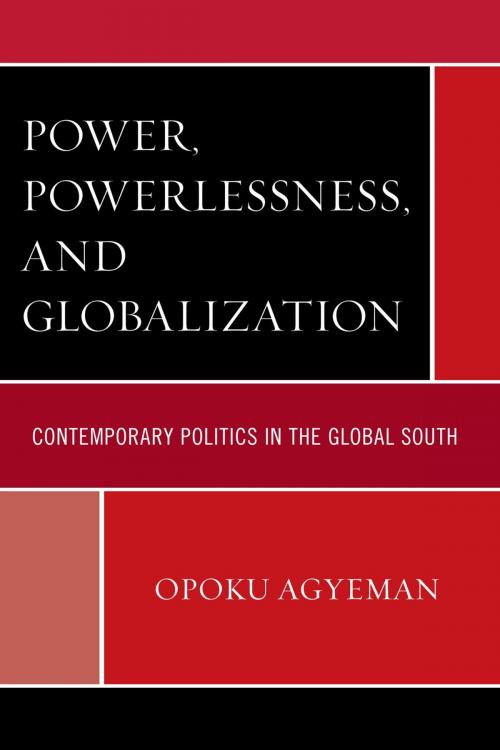Power, Powerlessness, and Globalization
Contemporary Politics in the Global South
Nonfiction, Social & Cultural Studies, Political Science, International, International Relations, History, World History| Author: | Opoku Agyeman | ISBN: | 9780739195222 |
| Publisher: | Lexington Books | Publication: | August 20, 2014 |
| Imprint: | Lexington Books | Language: | English |
| Author: | Opoku Agyeman |
| ISBN: | 9780739195222 |
| Publisher: | Lexington Books |
| Publication: | August 20, 2014 |
| Imprint: | Lexington Books |
| Language: | English |
This book is about imperialism-driven globalization, its historic impact on Africa, Latin America, and Asia, and, over time, the varied responses of the national political units and regional entities in these continents to the challenges of building countervailing power and laying foundations for independent development. Where genuine recovery and empowerment have emerged, this has been the result not only of the pursuit of “dignitalist” political and economic values that emphasize robust and sustained productivity geared toward uplifting the living standards and dignity of all the members of the national society, but also of the creation of indigenous institutions whose relations with the external world are defined by equality rather than dependence and subordination.
Opoku Agyeman argues that “dignification” is the fundamentally necessary response to imperialism’s inevitable afflictions of national/racial humiliation. It is the most crucial ingredient in the complex of motivations that propel formerly weak nation-states and regional communities to rise up and defend the honor of their people. As Mao Zedong told the world in 1949: “Ours will no longer be a nation subject to insult and humiliation. We have stood up.”
This study argues emphatically that it is a country’s or region’s developed or developing capabilities, not its historic and continuing victimization or habitual dependence on “charitable aid” and other “altruistic” interventions from the “international community,” that determines its success in escaping the scourge of powerlessness and underdevelopment. It further maintains that a people who have been brought low through brutal, dehumanizing imperialism cannot bypass the need for redemptive empowerment if they wish to regain honor and a proper place in the world. Finally, it takes issue with Joseph Stiglitz, Jeffrey Sachs, and others like them whose moralistic critiques of the rapacity of imperialistic globalization carry the unfortunate implication that it is possible for a fair and just world social order to come out of incremental reforms of philanthropically-motivated developed, powerful countries, in the structure and operations of global capitalism.
This book is about imperialism-driven globalization, its historic impact on Africa, Latin America, and Asia, and, over time, the varied responses of the national political units and regional entities in these continents to the challenges of building countervailing power and laying foundations for independent development. Where genuine recovery and empowerment have emerged, this has been the result not only of the pursuit of “dignitalist” political and economic values that emphasize robust and sustained productivity geared toward uplifting the living standards and dignity of all the members of the national society, but also of the creation of indigenous institutions whose relations with the external world are defined by equality rather than dependence and subordination.
Opoku Agyeman argues that “dignification” is the fundamentally necessary response to imperialism’s inevitable afflictions of national/racial humiliation. It is the most crucial ingredient in the complex of motivations that propel formerly weak nation-states and regional communities to rise up and defend the honor of their people. As Mao Zedong told the world in 1949: “Ours will no longer be a nation subject to insult and humiliation. We have stood up.”
This study argues emphatically that it is a country’s or region’s developed or developing capabilities, not its historic and continuing victimization or habitual dependence on “charitable aid” and other “altruistic” interventions from the “international community,” that determines its success in escaping the scourge of powerlessness and underdevelopment. It further maintains that a people who have been brought low through brutal, dehumanizing imperialism cannot bypass the need for redemptive empowerment if they wish to regain honor and a proper place in the world. Finally, it takes issue with Joseph Stiglitz, Jeffrey Sachs, and others like them whose moralistic critiques of the rapacity of imperialistic globalization carry the unfortunate implication that it is possible for a fair and just world social order to come out of incremental reforms of philanthropically-motivated developed, powerful countries, in the structure and operations of global capitalism.















